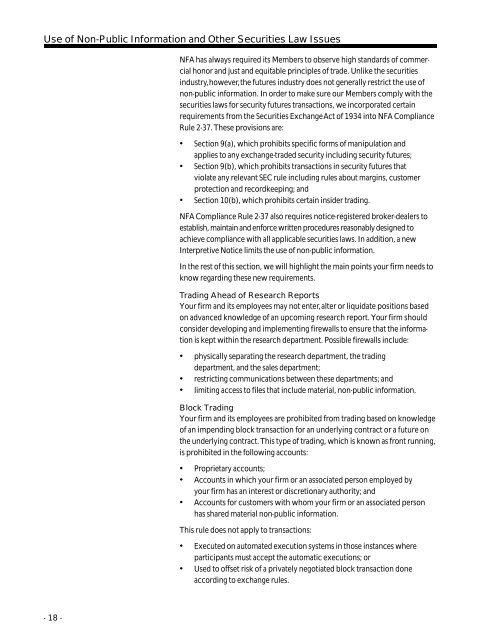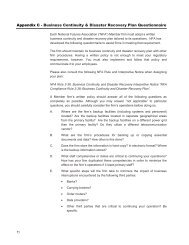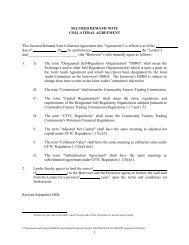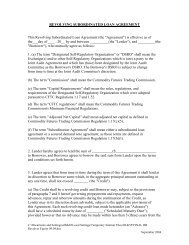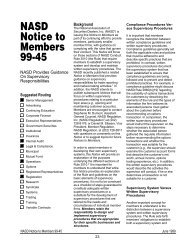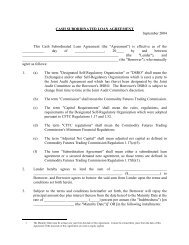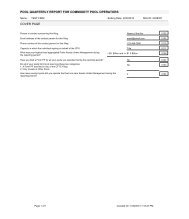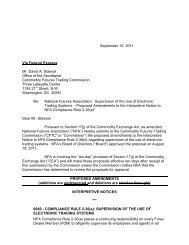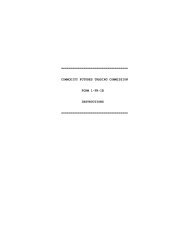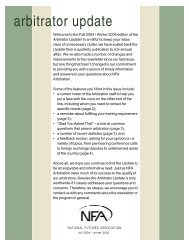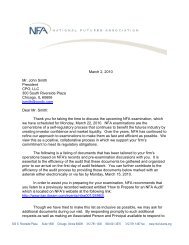Security Futures Products: A Regulatory Guide - National Futures ...
Security Futures Products: A Regulatory Guide - National Futures ...
Security Futures Products: A Regulatory Guide - National Futures ...
Create successful ePaper yourself
Turn your PDF publications into a flip-book with our unique Google optimized e-Paper software.
Use of Non-Public Information and Other Securities Law Issues<br />
NFA has always required its Members to observe high standards of commercial<br />
honor and just and equitable principles of trade. Unlike the securities<br />
industry, however, the futures industry does not generally restrict the use of<br />
non-public information. In order to make sure our Members comply with the<br />
securities laws for security futures transactions, we incorporated certain<br />
requirements from the Securities Exchange Act of 1934 into NFA Compliance<br />
Rule 2-37. These provisions are:<br />
• Section 9(a), which prohibits specific forms of manipulation and<br />
applies to any exchange-traded security including security futures;<br />
• Section 9(b), which prohibits transactions in security futures that<br />
violate any relevant SEC rule including rules about margins, customer<br />
protection and recordkeeping; and<br />
• Section 10(b), which prohibits certain insider trading.<br />
NFA Compliance Rule 2-37 also requires notice-registered broker-dealers to<br />
establish, maintain and enforce written procedures reasonably designed to<br />
achieve compliance with all applicable securities laws. In addition, a new<br />
Interpretive Notice limits the use of non-public information.<br />
In the rest of this section, we will highlight the main points your firm needs to<br />
know regarding these new requirements.<br />
Trading Ahead of Research Reports<br />
Your firm and its employees may not enter, alter or liquidate positions based<br />
on advanced knowledge of an upcoming research report. Your firm should<br />
consider developing and implementing firewalls to ensure that the information<br />
is kept within the research department. Possible firewalls include:<br />
• physically separating the research department, the trading<br />
department, and the sales department;<br />
• restricting communications between these departments; and<br />
• limiting access to files that include material, non-public information.<br />
Block Trading<br />
Your firm and its employees are prohibited from trading based on knowledge<br />
of an impending block transaction for an underlying contract or a future on<br />
the underlying contract. This type of trading, which is known as front running,<br />
is prohibited in the following accounts:<br />
• Proprietary accounts;<br />
• Accounts in which your firm or an associated person employed by<br />
your firm has an interest or discretionary authority; and<br />
• Accounts for customers with whom your firm or an associated person<br />
has shared material non-public information.<br />
This rule does not apply to transactions:<br />
• Executed on automated execution systems in those instances where<br />
participants must accept the automatic executions; or<br />
• Used to offset risk of a privately negotiated block transaction done<br />
according to exchange rules.<br />
- 18 -


